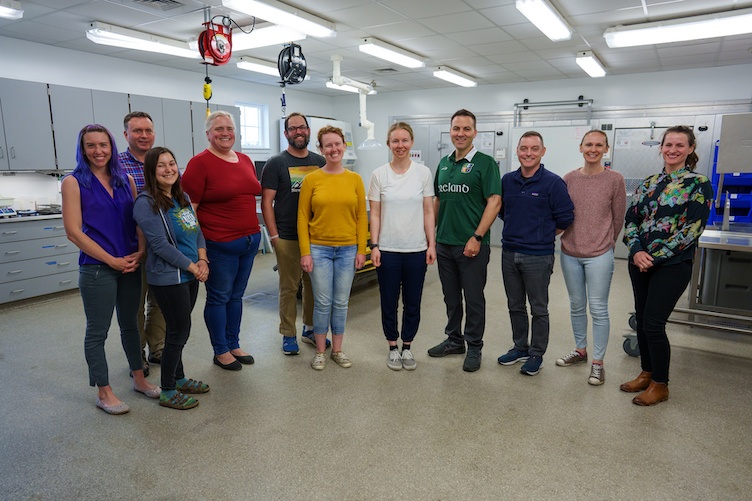
Department of Defense Joint Pathology Center (JPC) residents and NH Veterinary Diagnostic Lab (NHVDL) pathologists and staff in the necropsy lab at UNH. The NHVDL welcomed its second rotation of residents from the JPC this spring.
Elise LaDouceur, a civilian veterinarian working with the Department of Defense’s Joint Pathology Center (JPC), describes herself as “a bit of an enigma” because she is one of few team members who work remotely rather than at the Silver Spring, Maryland base.
That remote set-up paid particular dividends when the JPC began searching for necropsy laboratories to partner with for a residency program in the absence of such a facility at the DoD. LaDouceur was familiar with a highly regarded option that may have been one of few labs in the region able to accommodate all of the JPC’s needs.
And it was practically in her backyard.

JPC veterinary residents had the opportunity to perform a whale necropsy on the beach in Gloucester, Massachusetts, this spring. Photo taken under the authority of Seacoast Science Center's marine mammal standing agreement with NOAA Fisheries. field ID (SSC-23-039). credit: Seacoast Science Center Marine Mammal Rescue.
A resident of Durham, New Hampshire, LaDouceur reached out to UNH’s New Hampshire Veterinary Diagnostic Laboratory (NHVDL) last spring and set in motion a partnership with the JPC that is providing critical residency training to JPC veterinarians in necropsy, the scientific term for animal autopsy.
The NHDVL welcomed its second rotation of residents this May, following on the heels of the inaugural group last fall. Visiting military veterinarians receive two weeks of immersive training in the program that they wouldn’t have access to otherwise, and it’s a partnership that LaDouceur and Robert Gibson, director of the NHVDL, believe is valuable to all involved.
“It’s been a wonderful program. The first group we had absolutely loved the experience, and we just welcomed our second group,” Gibson says. “Animal health, human health and environmental health are interconnected in a philosophy called ‘one health.’ The fact that we are using a state-of-the-art facility here at UNH to be able to train the future veterinary pathologists who will help maintain and protect animal and human health is really fantastic.”
Indeed, LaDouceur’s enthusiasm for working with the NHVDL went well beyond geographic convenience. The lab is one of the largest such facilities in New England by volume, receiving samples and cases from throughout New Hampshire and the region. It is also fairly unique in that it has four board-certified pathologists on staff to help lead the training.
To become a board-certified pathologist, a veterinarian must complete three years of intensive residency training after vet school before passing board exams. The JPC is a renowned pathology program, Gibson says, but necropsy is one area in which it doesn’t have a facility on-site.
“Necropsy is an integral part of what they will do as pathologists, so the ability to have access to a necropsy floor is so valuable,” LaDouceur says. “Rob’s lab has a great variety of cases, and the pathologists at UNH each take a day with the residents during the two weeks, which gives the residents really great exposure to other pathologists.”
"The fact that we are using a state-of-the-art facility here at UNH to be able to train the future veterinary pathologists who will help maintain and protect animal and human health is really fantastic."
During the residency program, the JPC veterinarians work the NHVDL’s incoming caseload under the supervision of LaDouceur and the lab’s boarded pathologists. They get hands-on experience performing necropsies and reading surgical biopsies sent to the lab from numerous outlets (Gibson says the lab handles hundreds of autopsies and thousands of surgical biopsies in a year).
The benefits are evident for both the residents and the lab. The residents gain experience that they need to advance their careers, under expert supervision, while the lab pathologists get to spend time in a mentoring role while also sharing their normal caseload, freeing them up to work on additional cases.
“These are all active-duty military members, which can be a rigorous daily environment, so it’s nice for them to come to New Hampshire and have a couple of weeks where they are just focusing on lab work,” LaDouceur says. “And I think UNH really appreciates it because we come in and lighten their load a little bit, which gives them time to do projects they otherwise wouldn’t have time to do.”
The NHVDL doesn’t charge the JPC for use of the space, in part because of the shared workload benefit. But the arrangement also creates a unique opportunity to honor the greater commitment the visiting military representatives have made.
“We have a chance to extend a service to our military veterinarians, all of whom are performing a service to their country, and that sense of service is deeply embedded in the ethos of both UNH and our military,” says Gibson.
The program features one rotation per year. And if Gibson and LaDouceur have anything to say about it, it’s a partnership that is only just beginning.
“Building these kinds of affiliations makes us a stronger laboratory and will better poise us to continue to reach our top strategic goals,” Gibson says.
Adds LaDouceur: “It’s been a really great experience. I’m hoping this partnership goes on forever.”
-
Written By:
Keith Testa | UNH Marketing | keith.testa@unh.edu
















































